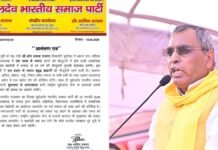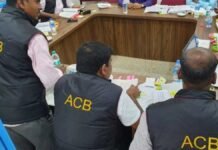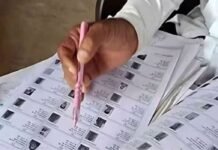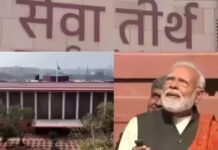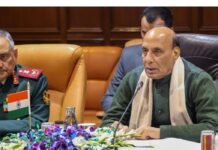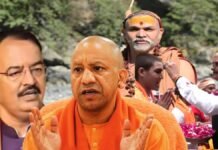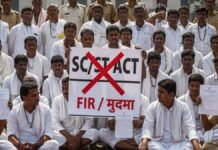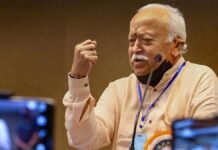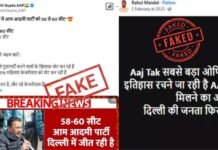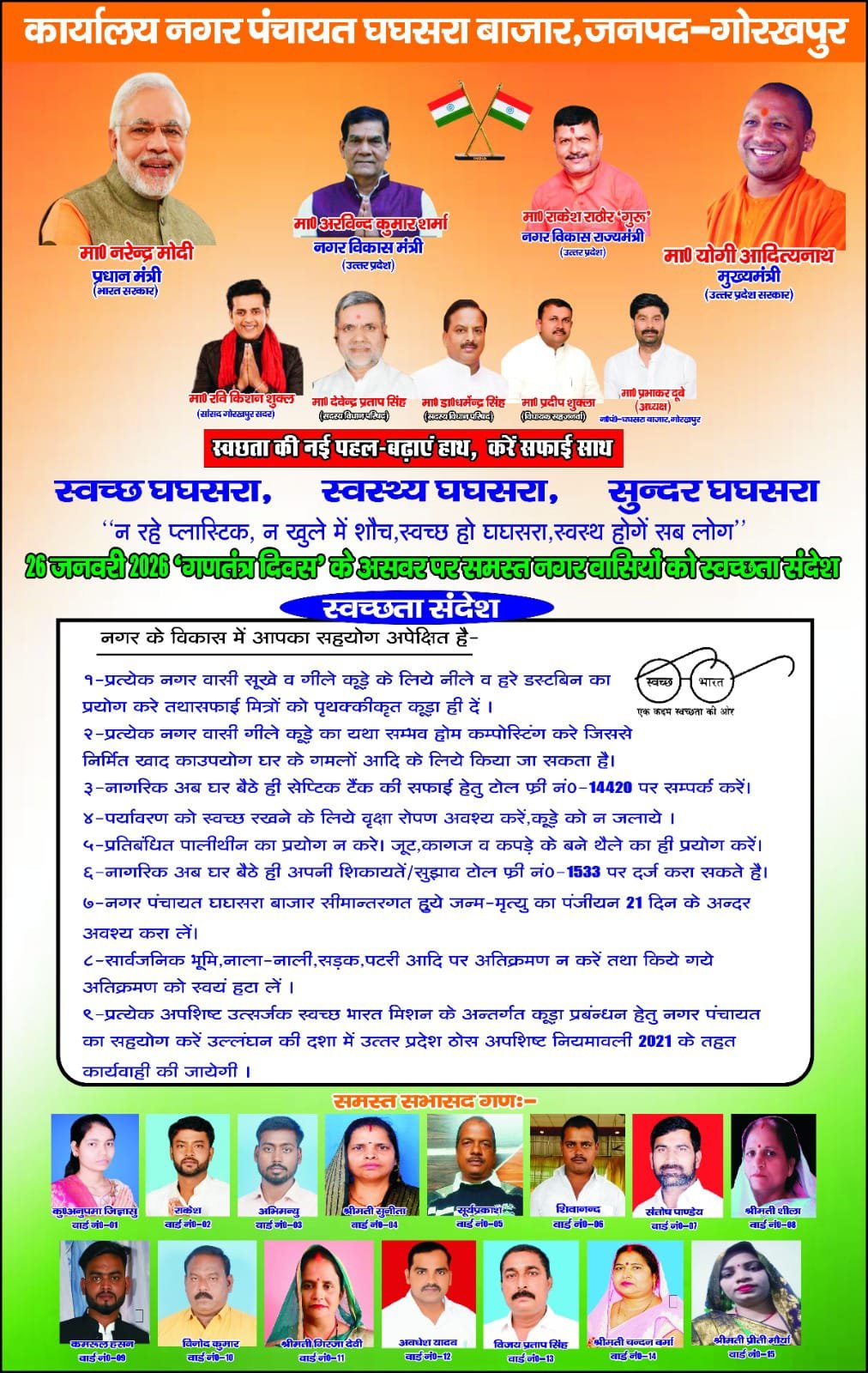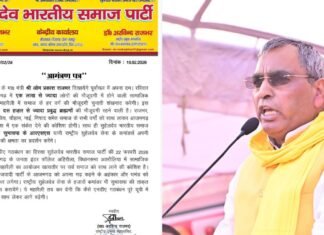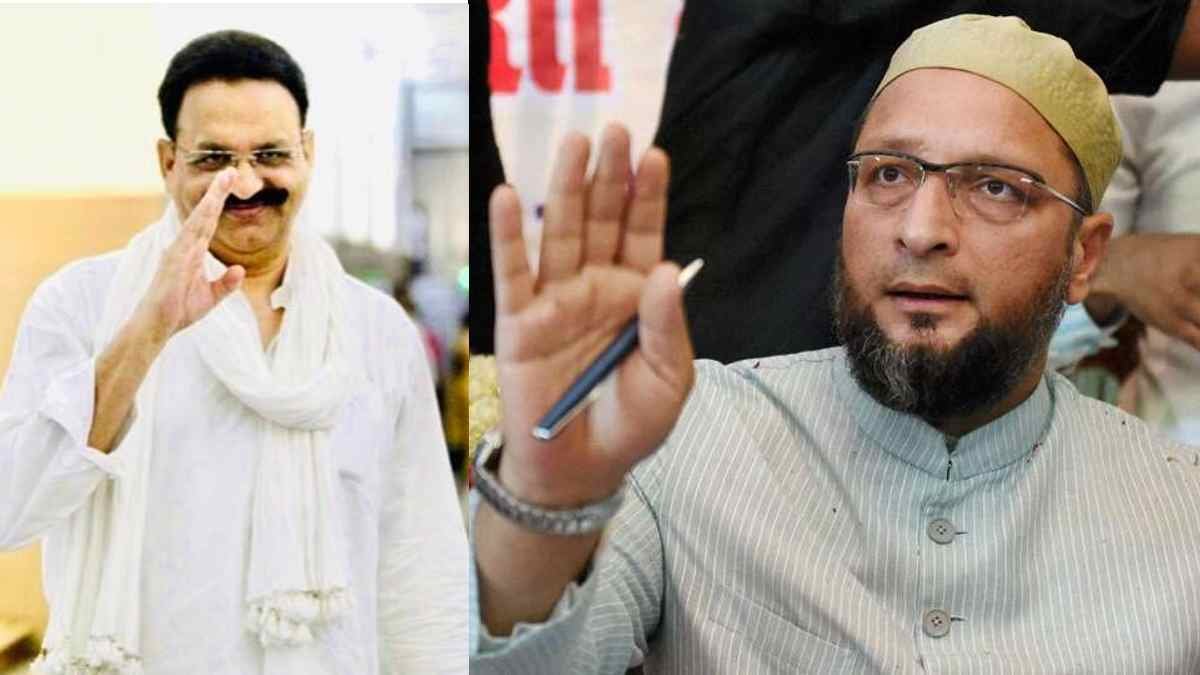To,
Hon’ble Mr. Sunil Arora,
The Chief Election Commissioner,
Election Commission of India, New Delhi,
Sub: Publish Age, Qualification, Criminal Antecedents and Total Assets
Sir,
- On 25.9.2018, the five Judges Bench of the Supreme Court has held: “116. Keeping the aforesaid in view, we think it appropriate to issue the following directions which are in accord with the decisions of this Court :- (i) Each contesting candidate shall fill up the form as provided by the Election Commission and the form must contain all the particulars as required therein. (ii) It shall state, in bold letters, with regard to the criminal cases pending against the candidate. (iii) If a candidate is contesting an election on the ticket of a particular party, he/she is required to inform the party about the criminal cases pending against him / her. (iv) The concerned political party shall be obligated to put up on its website the aforesaid information pertaining to candidates having criminal antecedents. (v) The candidate as well as the concerned political party shall issue a declaration in the widely circulated newspapers in the locality about the antecedents of the candidate and also give wide publicity in the electronic media. When we say wide publicity, we mean that same shall be done at least thrice after filing of nomination papers. 117. These directions ought to be implemented in true spirit and right earnestness in a bid to strengthen the democratic setup. There may be certain gaps or lacunae in a law or legislative enactment which can definitely be addressed by the legislature if it is backed by the proper intent, strong resolve and determined will of right-thinking minds to ameliorate the situation. It must also be borne in mind that the law cannot always be found fault with for the lack of its stringent implementation by the concerned authorities. Therefore, it is the solemn responsibility of all concerned to enforce the law as well as the directions laid down by this Court from time to time in order to infuse the culture of purity in politics and in democracy and foster and nurture an informed citizenry, for ultimately it is the citizenry which decides the fate and course of politics in a nation and thereby ensures that ―we shall be governed no better than we deserve‖, and thus, complete information about the criminal antecedents of the candidates forms the bedrock of wise decision-making and informed choice by the citizenry. Be it clearly stated that informed choice is the cornerstone to have a pure and strong democracy. 118. We have issued the aforesaid directions with immense anguish, for the Election Commission cannot deny a candidate to contest on the symbol of a party. A time has come that the Parliament must make law to ensure that persons facing serious criminal cases do not enter into the political stream. It is one thing to take cover under the presumption of innocence of the accused but it is equally imperative that persons who enter public life and participate in law making should be above any kind of serious criminal allegation. It is true that false cases are foisted on prospective candidates, but the same can be addressed by the Parliament through appropriate legislation. The nation eagerly waits for such legislation, for the society has a legitimate expectation to be governed by proper constitutional governance. The voters cry for systematic sustenance of constitutionalism. The country feels agonized when money and muscle power become the supreme power. Substantial efforts have to be undertaken to cleanse the polluted stream of politics by prohibiting people with criminal antecedents so that they do not even conceive of the idea of entering into politics. They should be kept at bay. 119. We are sure, the law making wing of the democracy of this country will take it upon itself to cure the malignancy. We say so as such a malignancy is not incurable. It only depends upon the time and stage when one starts treating it; the sooner the better, before it becomes fatal to democracy. Thus, we part. 120. The writ petitions and criminal appeals are disposed of accordingly.”
- Petitioner is filing this petition to secure fundamental right of voters, guaranteed under Article 19(1) of the Constitution viz. Right to know the Age, Qualification, Criminal Antecedents and Total Assets of candidates in spirit of the above stated Judgment dated 25.9.2018. The Court held that candidate and political parties shall publish the above stated details thrice in widely circulated newspapers and leading news channels. Petitioner submits that right to know of voters under Article 19 cannot be secured until candidates will publish the information’s on their Banners, Posters and Hoardings in addition to Electronic, Print and Social Media.
- Powers of the ECI under Article 324 have been repeatedly held to be wideranging. From the judgment of Ponnuswamy, 1952 SCR 218 [Page 226] where the phrase “conduct of elections” was interpreted widely, and held that ECI is charged with all steps necessary to ensure a smooth conduct of elections. This position has been bolstered by at least two Constitution Bench decisions declaring that where there is a void or a vacuum, the powers of the Election Commission could be exercised. [M.S.Gill, (1978) 1 SCC 405 at Para 39 [Majority] and Para 113, Special Reference No.1/2002, (2002) 8 SCC 237 at Para 76] It was precisely the above that was invoked in ADR Case, [2002) 5 SCC 294 at Paras 23 & 46] to conclude that the right of the voter under Article 19(1) of the Constitution ought to be fulfilled by compulsorily having antecedents of the candidate declared to them. As a result, directions were given to the Election Commission to solicit the same from candidates. Thereafter, Parliament stepped in to insert Sections 33-A and 33-B apart from Section 125-A in the RPA, 1951. Section 33-B which barred the disclosure of any other information contrary to the judgment in ADR was subject to a successful challenge in PUCL, (2003) 4 SCC 399.
- At present, Section 33-A merely mandates that the returning officer merely affix the affidavit with the candidate’s details “at a conspicuous place at his office”. In constituencies where millions of voters are involved, this is no longer a feasible option. It is imperative that this information is displayed widely, and onus must be on candidate seeking high Constitutional office to make a clean breast of things. The Apex Court has reiterated that contestants to legislative office ought to have high levels of integrity and the best available person ought to be chosen. [PUCL, (2013) 10 SCC 1,Para 53, Ashok Chavan, (2014) 7 SCC 99,Para 44] From the Indira Gandhi, [1975 Supp. SCC 1] till date, it is an established precept that free-fair elections are an inalienable part of constitutional system. [PUCL, (2013) 10 SCC 1, Manoj Narula, (2014) 9 SCC 1]
- While 17% candidates in 2014 elections had criminal charges framed against them, eventually the House had 33% of such individuals. Hence, “prima facie” criminal antecedents did not deter them being placed in Parliament. Numbers of such elected individuals has risen thrice from 2009 elections. It cannot probably be presumed that the electorates are deliberately choosing those who are suspected criminals to be their legislative representatives. It could only be that true information of their backgrounds and contents of their affidavits have not been made known to public. This is despite Article 19(1) right that is available to a voter at the time of voting. It may be noted that in Krishnamurthy, (2015) 3 SCC 467, the Apex Court has concluded that non-disclosure of antecedents amounts to “undue influence” and hence the election can be set aside.
- The VACUUM that therefore exists is in how the information of candidate placed in his Section 33-A affidavit is communicated to the electorate. It is here that directions may be issued by the ECI as under:
a . All advertisements for the candidacy of an individual to the Parliament and Legislative Assembly shall compulsorily and prominently carry details of- (i) Age and Educational Qualification of the Candidates; (ii) Criminal cases against him in which charges have been framed with description of every offence in Bold Letters [viz. FIR under Section 302, IPC, for killing two children, FIR under Section 376 IPC for raping one minor girls]; and, (iii) the combined value of fixed and movable assets of the candidate and his family members;
b. Above details shall cover minimum 33% space of each Banner, Poster, Hoarding etc. and minimum 33% time of every Audio Video recording etc. (minimum 20% if no such case is pending)
c. If the above are not adhered, then Returning Officer shall reject the nomination of the candidate. In any event, such non-disclosure would amount to undue influence and the election would be liable to set aside.
d. The above conditions shall be incorporated into Model Code of Conduct, Election Order and Instructions, framed by the Election Commission under Article 324 of the Constitution.
e. These directions shall be intimated to all political parties for strict adherence. Any violation of these directions would be treated as corrupt practice and invite apposite action by the Election Commission against political party concerned as well”
- There is a good reason why the ECI must take steps to control the menace of criminalization of politics. A host of reports by eminent commissions and committees including the Election Commission (which has constitutional status) in its “Proposed Electoral Reforms” (2004), the Law Commission in its 170th and 244th Reports (1999 & 2014), the Consultation Paper on Electoral Reforms issued by the National Commission to Review the Working of Constitution headed by eminent former Chief Justice of India Sh. M.N. Venkatachaliah (2002), the Second Administrative Reform Commission (2009) and the Vohra Committee (1993) have drawn attention to the severity of the problem and have suggested various electoral reforms to stem the tide of criminals flowing into our polity. Despite these reports and efforts of the Supreme Court, Executive has not taken apposite steps for decriminalization of politics.
- Taking note of the above reports, the Supreme Court has in a series of decisions over the last two decades taken steps to address the problem including by (i) recommending the setting up a high level committee to consider the Vohra Committee Report in Dinesh Trivedi v. Union of India, (1994) 4 SCC 306; (ii) directing the Election Commission to ensure that candidates file affidavits along with their nomination papers setting out the criminal cases pending against them in ADR Case [(2002) 5 SCC 294]; (iii) holding that the disqualification under Section 8 of the RPA, 1951 would apply even where sentences run consecutively beyond two years [K.Prabhakaran v. P.Jayarajan, (2005) 1 SCC 754]; (iv) striking down Section 8(4) of the RPA, which permitted sitting MP’s and MLA’s to continue in office if they have filed an appeal within a period of three months after conviction [Lily Thomas (2013) 7 SCC 653]. The most recently, on petitioner’s PIL [Ashwini Kumar Upadhyay v. Union of India & Another, WP(C) 699/2016, Order dated 01.11.2017], the Apex Court directed the Union to setup Special Courts to complete trial of pending cases against sitting MP’s and MLA’s within a period of one year.
- Criminalization of politics in India has only grown. Data published by the ADR shows that 24% MPs have criminal cases pending against them (12% had serious crimes such as murder, attempted murder, kidnapping, crime against women) in 2004, which increased to 30% (15% serious) in 2009 and 34% (21% serious) in 2014. Out of 7810 candidates analyzed for the 2009 elections to the Lok Sabha, 1158 or 15% declared criminal cases of which 610 or 8% had serious cases. Out of 8163 candidates for general elections in 2014, 1398 or 17% declared criminal cases of which 889 (11%) had serious cases.
- The problem is not confined to a single political party or to national level. In 2014, 31% MLA’s had criminal cases pending against them of which 15% had serious charges. What is alarming is that percentage of candidates with criminal antecedents and their chances of winning have actually increased steadily over the years. In fact, empirical analysis shows that, where charges against candidate are serious, it slightly increases statistical probability of winning. The study yields even more alarming insights about symbiotic relationship between criminals and politicians. Criminals who earlier used to help politicians win elections in hope of getting favours appear to have cut out intermediary.
- Political parties have become steadily more reliant on criminals as they self-finance their elections in an era where election have become phenomenally expensive and more likely to win than clean candidates. Political parties are competing with each other in a race to the bottom as they cannot afford to leave their competitors free to recruit criminals. Especially in the context of ethnic divisions such as caste and religious cleavages, criminals are able to get votes based on their caste or religious affiliation, their money and mussel power, their perceived willingness to “bend,” if not break, the law to favour their supporters and also because of coercion and intimidation including of their rivals.
- Criminals have no interest in standing as independent and want to stand as candidates of political parties because parties are connected to distinct families, ethnic groups and social bases. Aspiring candidates can tap these networks to expand their appeal beyond their own narrow support bases. Second, in a country with high rates of poverty and illiteracy, party symbols hold great weight and serve as an important visual cue through which millions of voters connect to electoral politics. As such, historical legacy of parties matter a great deal in democracy. The consequences of permitting criminals to become legislators are very serious. During electoral process itself, not only do they deploy enormous amounts of illegal money to interfere with outcome, but also intimidate voters and rival candidates. Thereafter, in our weak rule-of-law context, once they gain entry to governance, they interfere with and influence functioning of government in favour of themselves and members of their organization by corrupting government officers and, where that does not work, by using contacts with Ministers to make threats of transfer and initiation of disciplinary proceedings. Few become Ministers themselves, which makes situation worse. They attempt to subvert administration of justice by hook or crook to prevent cases against themselves from being concluded and where possible to obtain acquittals. The long delays in disposal of cases and low conviction rates is testimony to their influence.
- Empirical evidence supports the above view, therefore, that to the extent that the current legislative framework permits criminals to enter the electoral process and become legislators, it (i) interferes with the purity and integrity of the electoral process; (ii) violates the right to choose freely the candidate of the voter’s choice and, therefore, the freedom of expression of the voter under Article 19(1)(a); (iii) amounts to a subversion of democracy, which is part of the basic structure; and, finally, (iv) is antithetical to the rule of law which is at core of Article 14.
- The importance of insights from the social sciences in constitutional decision-making should not be minimized. Without innovations such as the Brandeis brief, which relied as much on data/analysis from social sciences as legal argument, many path-breaking decisions by the U.S. Supreme Court that led to a fundamental reorientation of constitutional law in the US, would not have been possible. The decision in Brown v. Board of Education, 347 US 483 (1954) on affirmative action was based on data / analysis from social sciences.
When more than one-third of MP’s, cutting across all political parties, have criminal cases pending against them, it is not surprising that a Parliamentary Standing Committee in 2007, simply rejected recommendation of the Law Commission 170th Report and ECI’s “Proposal for Electoral Reforms-2004” to impose disqualification on persons against whom charges have been framed for serious offences.
- The decision of the Apex Court supports compelling necessity to take immediate steps to deter candidates who have charges framed against them from standing for elections. In the context of upholding the denial of the right to vote to those confined in jail or in police custody, the Supreme Court in Anukul Chandra Pradhan [(1997) 6 SCC 1], held: “…Criminalization of politics is the bane of society and negation of democracy. It is subversive of free and fair elections, which is a basic feature of the Constitution. Thus, a provision made in the election law to promote the object of free and fair elections and facilitate maintenance of law and order, which are essence of the democracy, must, therefore, be so viewed”. The Law Commission in 244th report records eminent jurist Sh.Nariman “…the need for enlarging the whole concept of disqualification and emphasized that the law needs to go ahead in order to promote purity and integrity of the democratic process.” In ADR Case, the Court held that “voters may not elect law-breakers as law-makers and some flowers of democracy may blossom.” Candidates with criminal antecedents interfere with purity of electoral process through coercion and intimidation of voters and rival candidates, which is a violation of freedom of expression of voter
- under Article 19(1)(a). The Apex Court in Prabhakaran, (Para. 54) gave judicial recognition- “persons with criminal background do pollute process of election as they don’t have many a hold barred and have no reservation from indulging in criminality to win success at election.” In PUCL v. Union of India, [(2013) 10 SCC 1 (Para. 28)], the Apex Court recognized that “…casting of the vote is a facet of the right of expression of an individual and the said right is provided under Article 19(1)(a) of the Constitution of India (vide Association for Democratic Reforms, (2002) 5 SCC 294 and People’s Union for Civil Liberties, (2003) 4 SCC 399)…”. The Apex Court in Manoj Narula Case has held that: “A democratic polity, as understood in its quintessential purity, is conceptually abhorrent to corruption and especially corruption at high places, and repulsive to idea of criminalization of politics as it corrodes the legitimacy of the collective ethos, frustrates the hopes and aspirations of citizens and has the potentiality to obstruct, if not derail, the rule of law …” [Also in Lok Prahari [(2018) 4 SCC, 699]; and Krishnamoorthy [(2015) 3 SCC 467]
- Permitting criminals to become legislator results in breakdown of rule of law in terms of both the government machinery as well as system of administration of justice. Hence, ECI may take step to deter criminals from becoming legislators and uphold rule of law inherent in Article 14. There are precedents for the Apex Court to give directions to the ECI to: (i) preserve the purity of elections and (ii) protect the fundamental rights of voters guaranteed under Article 19. In ADR Case, the Court directed the ECI to call for information on affidavit from each candidate, inter alia, listing offences with which he is charged and total assets by issuing necessary order in exercise of power under Article 324 of Constitution:
- Finally, in our view this Court would have ample power to direct the Commission to fill the void, in the absence of suitable legislation covering the field and the voters are required to be well informed and educated about contesting candidates so that they can elect a proper candidate by their own assessment. It is the duty of the executive to fill the vacuum by executive orders because its field is coterminous with that of legislature, and where there is inaction by executive, for whatever reason, judiciary must step in, in exercise of its constitutional obligations to provide a solution till such time the legislature acts to perform its role by enacting proper legislation to cover the field. The adverse impact of lack of probity in public life leading to a high degree of corruption is manifold. Therefore, if candidate is directed to declare his/her spouse’s and dependants’ assets-immovable, movable and valuable articles-it would have its own effect….”
- In Subramaniam Balaji v. State of T.N., (2013) 9 SCC 659, the Court directed the ECI to exercise its powers to frame guidelines governing the contents of election manifesto to be included in Model Code of Conduct. “87. Therefore, considering that there is no enactment that directly governs the contents of the election manifesto, we hereby direct the Election Commission to frame guidelines for the same in consultation with all the recognized political parties as when it had acted while framing guidelines for general conduct of the candidates, meetings, processions, polling day, party in power, etc. …. We are mindful of the fact that generally political parties release their election manifesto before the announcement of election date, in that scenario, strictly speaking, the ECI will not have the authority to regulate any act which is done before the announcement of the date. Nevertheless, an exception can be made in this regard as the purpose of the election manifesto is directly associated with the election process.”
- In People’s Union for Civil Liberties v Union of India (2013)10 SCC 1, the Supreme Court directed the Election Commission to give voters the option to choose “none of the above” in every election. The Court held: “53.Thus in a vibrant democracy, the voter must be given an opportunity to choose none of the above (NOTA) button, which will indeed compel the political parties to nominate a sound candidate. This situation palpably tells us the dire need of negative voting. “63.… In view of our conclusion, we direct the Election Commission to provide necessary provision in the ballot papers/EVMs and another button called “None of the Above” (NOTA) may be provided in EVMs so that the voters, who come to the polling booth and decide not to vote for any of the candidates in the fray, are able to exercise their right not to vote while maintaining their right of secrecy. Inasmuch as the Election Commission itself is in favour of the provision for NOTA in EVMs, we direct the Election Commission to implement the same either in a phased manner or at a time with the assistance of the Government of India….” It is necessary to state that the proposed amendment does not constitute disqualification in violation of Articles 102(1)(e) or 191(1)(e) of the Constitution and right to know about the candidates is fundamental right of voters under Article 19.
- Proposed direction would not breach the principle of separation of powers because there is a legislative vacuum insofar as Parliament has not enacted any legislation in the field covered by the Symbols Order, which has been issued by ECI in exercise of its powers under Article 324. Power of the ECI under Article 324 operates in areas left unoccupied by legislation and is plenary in character. [Kanhiya Lal Omar v. R.K. Trivedi, (1985) 4 SCC 628 (para. 16). The power of “superintendence, direction and control” of the conduct of elections vested in the ECI is executive in character. [A.C. Jose, (1984) 2 SCC 656] The Symbols Order is traceable to power of the ECI under Article 324. [Kanhiya Lal Omar (para. 16).] The power to amend, vary or rescind an order which is administrative in character under Section 21 of the General Clauses Act, specifically referred to in paragraph 2(2) of the Symbols Order, would permit the ECI to withdraw recognition to a political party. [Janata Dal Samajwadi v. Election Commission, (1996) 1 SCC 235 (para. 6). Thus, it is clear that the proposed direction would operate in a field where there is a legislative vacuum. In fact, it is vital because the functions performed by legislators are vital to democracy and there is no reason why they should be held to lower standards than IAS Officers. Candidates for IAS certainly would not be considered at all if there were criminal cases pending against them, let alone if charges had been framed in serious offences.
- There are very few constitutional offices as important as that of a Member of Parliament or of a State legislature in our democracy. In Narasimha Rao Case (1998) 4 SCC 626 (162), the Constitution Bench of the Supreme Court, while holding that a Member of a Parliament or a State Legislature is a “Public Servant” for purposes of the Prevention of Corruption Act, 1988 held that: “In a democratic form of government, it is the Member of Parliament or a State legislature who represents the people of his constituency in the highest law-making bodies at the Centre and the State respectively. Not only is he the representative of the people in the process of making the laws that will regulate their society, he is their representative in deciding how the funds of the Centre and the States shall be spent and in exercising control over the executive. It is difficult to conceive of a duty more public than this or of a duty in which the State, the public and the community at large would have greater interest.”
- The ECI cannot remain a mute spectator if the very foundations of our Republic crumble in front of its eyes. Moreover, proposed direction neither adds an eligibility condition in Articles 84/173 nor imposes a disqualification in violation of the provisions of Article 102(1)(e) or 191(1)(e). The Apex Court has already directed to publish the criminal antecedents and assets thrice in widely circulated newspapers and leading news channels. Petitioner is additionally seeking publication of these information on banners, posters and hoardings also.
Sir,
- Keeping in view the growing trend of criminalization of politics and to secure fundamental right of voters, please issue directions to registered and recognized political parties and contesting candidates as under:
a) All advertisements for the candidacy of an individual to Parliament and Legislative Assembly shall compulsorily and prominently carry details of- (i) Age and Educational Qualification of the Candidate (ii) Criminal cases against him in which charges have been framed with description of every offence in Bold Letters [viz. FIR under Section 302, IPC, for killing a child, FIR under Section 376 IPC for raping one girl]; and, (iii) the combined value of fixed and movable assets of candidate and his family members;
b) each candidate and every political party shall publish above details thrice in widely circulated newspapers and leading news channels within 7days of nomination [ECI shall provide list of widely circulated Newspapers and leading news channels based on the latest Circulation and TRP];
c) Above details shall cover minimum 33% space of each Banner, Poster, Hoarding etc. and minimum 33% time of every Audio Video recording etc. (minimum 20% if no criminal case is pending against the candidate)
d) Every political party shall publish the above details on Home Page of its Official Website in Bold Letters (viz. font size – 15, line spacing – 1.5) within 3 days of the nomination of the candidate;
e) If above directions are n



